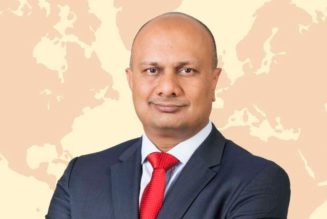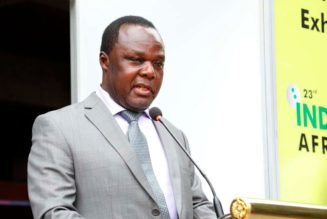Companies
Airtel opens talks for sale of 30pc stake to Kenyans
Friday February 24 2023
Airtel Africa Group CEO Segun Ogunsanya during an interview on the sidelines of the launch of the telco’s eSIM (embedded sim), a digital sim that enables customers to access the same functionality as someone using a physical sim on February 23, 2022. PHOTO | DIANA NGILA | NMG
Airtel Kenya is seeking Kenyan investors to buy a 30 percent stake in the telecoms operator ahead of the March 2024 deadline of complying with revised ownership rules that are meant to encourage local ownership of ICT firms.
This signals that the firm is not keen to seek a waiver or an extension of time for compliance as it mulls over listing the stake on the Nairobi Securities Exchange (NSE) as an alternative.
The State last April unveiled a licensing policy that gave telecoms firms up to March 2024 to ensure local ownership of at least 30 percent.
The policy also increased the local ownership threshold from a minimum of 20 percent, a cap that has been in place since 2008.
Airtel Africa CEO Segun Ogunsanya said on Thursday that the operator was in talks with the Communications Authority of Kenya (CA) and the ICT ministry to strike a sale deal that includes either getting a strategic investor or listing the local unit on the Nairobi bourse.
“There are a number of options. We can identify a local shareholder or we can also list on Kenya’s stock exchange,” said Mr Ogunsanya on Thursday on the sidelines of an event to launch a virtual SIM card in Nairobi.
“We keep discussing with the regulator as to which one is the best vehicle to ensure there is local participation in the business. We commit to getting this done before the deadline next year, March 2024.”
A few firms, including Airtel Kenya, have been exempted from the previous 20 percent shareholding rule, a window that allowed billionaire investor Naushad Merali to sell a significant portion of his shareholding in the firm worth billions of shillings without contravening the law.
Airtel has signalled that it would avoid this path.
Selling the stake directly to billionaires or high-net-worth investors like local pensions funds could be an option for Airtel that cut its net loss to $18.37 million (Sh2.32 billion) in the year to March 2022 compared with $22.37 million (Sh2.8 billion) in the previous period.
Read: Airtel eats into Safaricom voice market dominance
Airtel is yet to involve a transaction advisor in the stake sale discussions, with Mr Ogunsanya saying that was not essential at this point.
Airtel Africa, the parent of Airtel Kenya, operates in 14 African countries and is listed on both the London Stock Exchange and the Nigerian Stock Exchange.
The firm is the third-largest company by market capitalisation at Nigerian Stock Exchange worth Sh1.67 trillion after Dangote Cement and MTN Nigeria.
It would have to clear the barrier that requires firms seeking to list on NSE to have a track record of profits if the operator opts to make the local subsidiary, Airtel Kenya, a public firm.
The Nairobi bourse demands that firms be profitable ahead of listing on the main segment, but has less stringent requirements for the alternative segment.
“The issuer must have declared profits after tax attributable to shareholders in at least three of the last five completed accounting periods to the date of the offer,” say the NSE listing rules.
The net assets of the company wishing to list on the main market should also not be less than Sh100 million.
Airtel Kenya had $950.99 million (Sh120 billion) assets as at end of March last year against $1.19 billion (Sh151 billion) liabilities, making it technically insolvent.
The NSE does not have profitability and net assets threshold for firms listed on the Growth Enterprise Market Segment, which was started for small and medium-sized firms showing growth potential.
The revised ownership rules look set to trigger deal-making in Kenya’s rapidly expanding information and telecoms sector, a potential that has drawn the interest of foreign companies.
Analysts reckon it could also lead to a number of firms seeking a listing on the NSE for compliance, though most non-compliant firms would prefer to sell a stake directly to billionaires or high-net-worth investors like local pension funds.
India’s Bharti Airtel fully owns the Kenyan unit, which in March 2013 was granted an exemption to the local shareholding rule without a limited period for compliance.
To attract new investments into the sector, the regulation capping foreign ownership of telecoms companies at 80 percent was in 2009 relaxed to allow foreigners to launch operations without a Kenyan partner and gradually comply by finding local partners in three years.
Locals own more than half of Safaricom while the government fully owns Telkom Kenya after buying a 60 percent stake from private equity firm Helios Investment Partners in August last year.
Airtel’s difficulties in finding a buyer for the stake have been linked to the mismatch between the company’s valuation and local investors’ assessment of its worth based on the position that the business remains in the loss-making territory.
This position is what prompted the State to offer Airtel an open-ended waiver on the local ownership rule.
Mr Merali owned a 40 percent stake in Airtel Kenya then known as Zain in the late 1990s and made a number of share sales in the years to February 2011.
Read: Airtel Kenya splits mobile money after selling minority stake
He sold his remaining five percent stake for Sh738 million in a deal that valued shares equivalent to 30 percent ownership at Sh4.5 billion.
Airtel has found it difficult to shake the dominance of rival telco Safaricom despite setting off a fierce price war that has partly contributed to the current low calling rates.
The low-price model has helped it to gain market share but failed to make it profitable. Airtel Kenya’s subscriber market share stood at 26.3 percent at the end of September, from 14.9 percent in September 2017.
Mr Merali owned 40 percent of the company when his investment firm, Sameer Group, jointly launched KenCell Communications with its French partner, Vivendi, in 2000.
Three years later, when the French firm decided it was time to leave Kenya, Mr Merali used his pre-emptive rights to play one of the smartest boardroom chess games that pitted a number of global telecoms giants against each other for Vivendi’s stake.
He bought the Vivendi stake in KenCell at $230 million and sold it to a new partner, Celtel International, the very same day for $250 million — earning a profit of $20 million (Sh2.16 billion).
In 2008, he sold half of his 40 percent stake to Zain and further reduced it to five percent with the 15 percent sale in 2009 for $63.75 million (then Sh6.8 billion).









